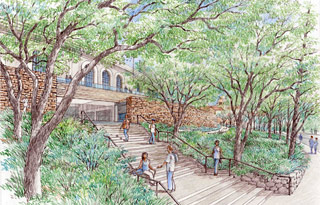UC Berkeley Web Feature
Student-athlete facility to get its day in court Sept. 19
BERKELEY – The judge presiding over legal challenges to UC Berkeley's planned Student-Athlete High Performance Center - the first phase in a multi-year southeast-campus plan that includes seismic retrofitting of Memorial Stadium - has set trial for Sept. 19, responding to the university's growing sense of urgency and giving Cal fans hope that the project schedule can get back on track.
 An artist's conception of the approach to the Student-Athlete High Performance Center, nestled beneath the west side of Memorial Stadium. (UC Berkeley image) |
Alameda Superior Court Judge Barbara Miller issued a preliminary injunction in January barring site development until three lawsuits, since consolidated into a single case, could be heard at trial. Since then, pre-construction planning has continued, explained Athletics Director Sandy Barbour, "so that if we prevail in September we're ready to go. We've lost six to eight months, but we can gain some of that back and still construct the high-performance center without disrupting a football season."
If there is a ruling in the university's favor in September, Barbour said, construction could begin during this fall's football season, continue through the 2008 season, and the new facility could be occupied before the opening game on the 2009 football schedule.
Co-plaintiffs in the suit to block the 132,500-square-foot, state-of-the-art performance center are the city of Berkeley, the Panoramic Hill Association - a residents' group concerned about parking and congestion in the neighborhood above the 84-year-old stadium - and the California Oak Foundation, which wants to preserve a small grove of oaks on the site of the planned facility. The trees, most of which were planted by the university when Memorial Stadium opened in 1923, would be replaced on a 3-to-1 basis if the campus's plans are approved.
What had loomed as the most serious obstacle to the university's plans - the possibility of active faults under the site itself - was effectively put to rest in May, when additional site testing by Geomatrix, an independent consulting firm, found no active fault traces on the student-athlete center site. Construction of new buildings on an active earthquake fault is prohibited under the state's Alquist-Priolo Earthquake Zoning Act, which the city of Berkeley has invoked in its lawsuit.
Although the latest geologists' finding "gives us even more confidence of prevailing at trial," Barbour said, "it would certainly be our hope" that the newest test results might encourage city officials to seek an out-of-court settlement with the university.
"I've always believed that there was much more that unites us in all this than divides us," she said, "and that there are better uses of the taxpayers' resources and the university's resources than a trial and a lawsuit."
The additional geologic testing was sought by the city of Berkeley, Barbour said, and the university agreed to it in an effort to be responsive to the concerns of its neighbors - just as it's done since the project was announced in November 2005.
"We have listened. We believe we have been responsive," Barbour said, noting adjustments to the project meant to address concerns about parking, tree removal, and even the exterior design of the facility. "I think these efforts have largely flown under the radar. We're not inflexible, we're not saying, 'Here's our project and, boom, we're doing it, and we're not concerned about these other things.' Because we are."
And as lawyers prepare for the courthouse - if it comes to that - campus officials continue to make their case for the new facility in the court of public opinion.
"The bottom line," Barbour said, "is providing safe and quality facilities for over 400 student-athletes and another 40 to 50 staff and coaches. And that's just Phase 1 ... From a public-perception standpoint, this project has in many ways been misunderstood - that it's strictly about football, that it's about taking down trees in an ancient grove. And it's not. It's about 13 of our 27 intercollegiate programs. It's about safety. It's about conditions for success."
That, she added, explains the intense interest on the part of Cal backers. "I have never, in 27 years in athletics, been involved with a capital project that has had more passion and more support from fans and donors," Barbour said. "This is what people who care about Cal athletics care about."

